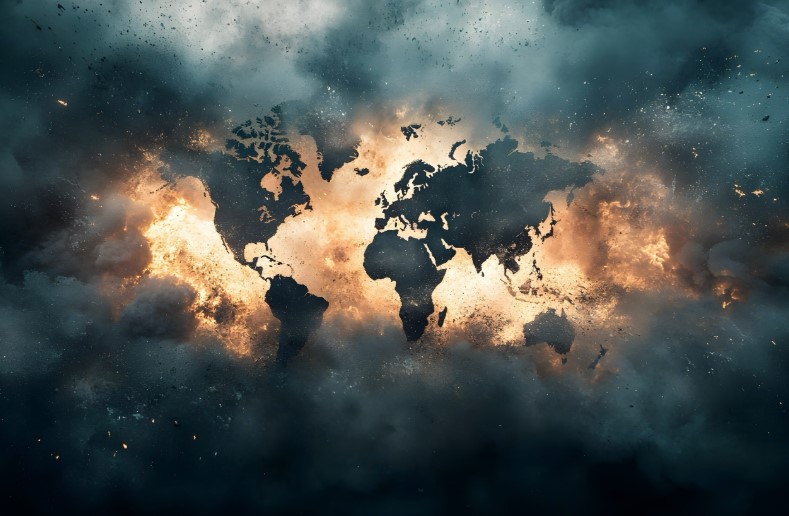Hybrid Warfare: The Ongoing Tension
Amid rising global tensions, defense experts are increasingly concerned about the potential for China to escalate its longstanding campaign against Taiwan. Beijing has shown a clear desire to take control of Taiwan for decades, a sentiment that has grown stronger since the pro-independence Democratic Progressive Party (DPP) took power in Taiwan in 2016. Since then, China has intensified its hybrid warfare tactics against the island. Hybrid warfare refers to the use of various methods to influence and destabilize a target without directly resorting to full-scale military force.
China’s tactics have included diplomatic isolation of Taiwan, spreading false information to weaken public trust in the government, cyber-attacks on Taiwanese institutions, and economic pressure aimed at discouraging local support for Taiwan’s leadership. China has also ramped up military intimidation through frequent airspace violations and large-scale military drills near Taiwan’s borders. This ongoing hybrid warfare, although aggressive, has stopped short of a full invasion.
Escalating Threat Perception and Military Confidence
The case of Russia’s invasion of Ukraine provides valuable insights into how a hybrid warfare strategy can evolve into an all-out conventional war. Russia’s initial intervention in Ukraine started in 2014, following the overthrow of Ukraine’s pro-Russian president, Viktor Yanukovych. At that time, Russia used covert military operations in Crimea and the Donbas region, where many ethnic Russians lived, in an attempt to maintain influence. Despite these efforts, Russia’s leaders still hoped to restore diplomatic relations with Ukraine, which led them to avoid full-scale military engagement.
However, as Ukraine pursued stronger ties with the West, particularly with NATO and the European Union, Russia’s perception of the threat grew. This heightened threat perception ultimately led Russia to launch a full-scale invasion of Ukraine in February 2022. If Moscow had not viewed Ukraine’s shift towards the West as such a significant threat, it might not have escalated to war.
Similarly, China’s threat perception of Taiwan has been significant but not yet at a critical level. Taiwan’s government has long insisted on its sovereignty and independence but has avoided making a formal declaration to prevent provoking Beijing. If Taiwan were to make such a declaration, China could perceive the situation as an existential threat, prompting a shift from hybrid warfare to direct military action.
Taiwan’s government has maintained a cautious stance, while China has warned that it will meet any formal declaration of Taiwan’s independence with military force. The increasing tensions could potentially trigger an escalation, similar to what Russia caused in Ukraine.
Military Strength and Deterrence
With nearly 2 million active-duty people, China boasts one of the greatest militaries in the world. This vastly outnumbers Taiwan’s military, which has over 169,000 active soldiers. Beijing also spends more on defense, with a budget of $224 billion, almost twelve times Taiwan’s defense spending. Despite this, a military invasion of Taiwan is not a simple task. China faces two major challenges.
First, since its invasion of Vietnam in 1979, China has refrained from engaging in full-scale combat. This means that its military capabilities and strategies have not been tested in real combat for decades. Second, a successful invasion of Taiwan would require a large-scale amphibious operation, which is one of the most complex and difficult military strategies to execute. The potential for failure in such an operation is high, and China is aware of the risks involved.
This military uncertainty is a crucial factor in why China has preferred hybrid warfare over direct military engagement so far. However, if China becomes more confident in its military readiness and capabilities, it may feel emboldened to escalate to a full-scale invasion, just as Russia did with Ukraine.
Meanwhile, Taiwan’s defense strategy hinges heavily on its relationship with the United States. The U.S. has repeatedly pledged to support Taiwan in the event of a Chinese military attack. This alliance serves as a critical deterrent against Beijing’s aggression. However, if the U.S. were to weaken its stance or fail to respond strongly to China’s actions, the deterrence factor would diminish, and Taiwan could become more vulnerable to Chinese aggression.
Hybrid Warfare: The Growing Threat to Taiwan
The situation in Taiwan mirrors what occurred in Ukraine before 2022, with both countries facing growing external pressures and hybrid warfare tactics from more powerful neighbors. The ability to deter further aggression through strong military alliances and readiness will play a crucial role in Taiwan’s ability to defend its sovereignty.
The shift from hybrid warfare to conventional military action is a significant concern for Taiwan, as lessons from Ukraine’s experience with Russia highlight the potential dangers of underestimating the threat perception of neighboring powers. Taiwan’s situation is unique, with China’s military dominance and the strategic importance of the island adding complexity to any potential conflict. While Taiwan’s military is significantly outnumbered, the balance of power is also influenced by its alliances and international support. The escalation of tensions in the Taiwan Strait requires careful attention and continued vigilance to avoid further military conflict.





